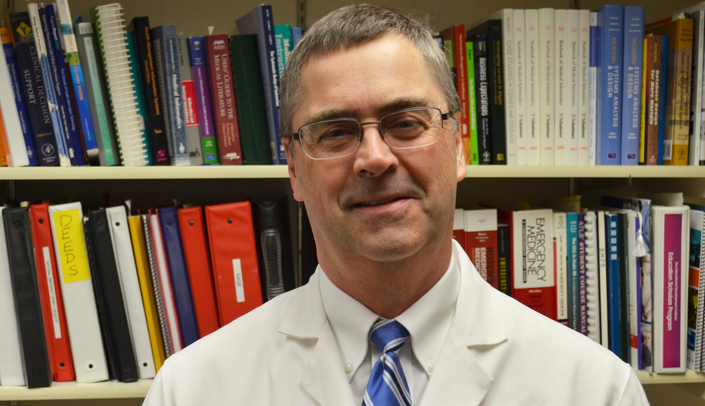James McClay, M.D., UNMC associate professor of emergency medicine, is leading a local team that has partnered with 10 academic medical centers to form the Greater Plains Collaborative (GPC).
The GPC, led by Kansas University Medical Center (KUMC), is one of 11 Clinical Data Research Networks nationally that form the Patient-Centered Outcomes Research Network. The partnership launched in March and along with it comes $7 million in funding to develop a turn-key clinical research network supporting national comparative effectiveness research trials.
Opt-out option
The team also is working on creating an “opt out” form in One Chart. They also are reaching out to the community to engage them in making our research more patient-centered, answering questions important to them. Leaders have one goal in mind- to make it possible to do extensive research on large patient populations.
“We are creating an infrastructure where every patient may contribute their data to create a national learning system,” Dr. McClay said.
The system will be operational next fall. At that time, the network will begin to respond to requests for large scale comparative effectiveness trials.
“Our intent is to create a turn-key infrastructure that turns clinical research into an information science.
PCORI was created by the Affordable Care Act in 2010. Its goal is to support research into how health conditions can be prevented, diagnosed, treated, monitored and managed. The hope is by identifying what works best, researchers will save time and money and transform the way research is performed.
Part of the first phase is to build an enterprise research data warehouse system by extracting information out of One Chart and combining it with other data sources. UNMC and Nebraska Medicine have created a de-identified data set containing no protected health information (PHI).
“This makes clinical information available to researchers and provides them the ability to share and interact collaboratively across our network,” Dr. McClay said. “This funding allows us to reinvent how we do research locally as well as regionally and nationally.”
Currently, Dr. McClay says researchers spend up to $8,000 and 200 hours for each research patient.
“It’s time not spent on the idea, but instead the forms, the committees and the approvals,” he said. “The infrastructure we are putting in place simplifies research processes, reducing the barriers to answering research questions in clinical care.”
When phase one is complete, the clinical trial information will be in One Chart. Once a trial is approved, providers will receive an alert that their patient is eligible for the trial and it will prompt them to ask the patient to participate.
“This will position us to compete for ongoing trials,” Dr. McClay said. It also will become more efficient to recruit patients for clinical trials.

How about an "opt in" option so that your information would be used only with your knowledge and consent. If I have to "opt out", I plan to never use any facility that uses "one chart".